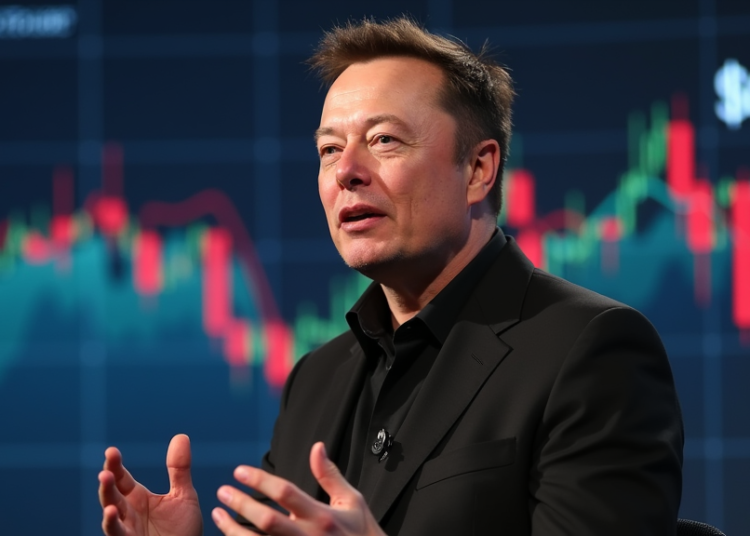Elon Musk is making headlines with his ambitious proposal for DOGE federal spending cuts, aiming for a remarkable $4 billion reduction per day by 2026. According to economist Jason Furman, achieving this target could result in a staggering 30% decrease in government expenditures, translating to about $1.5 trillion annually. This initiative, spearheaded by Musk through the Department of Government Efficiency (DOGE), seeks to slash the federal budget by $2 trillion, a move that has raised eyebrows among fiscal experts. As the conversation unfolds, questions about the implications of these cuts on essential services and programs are gaining traction. With a target date set for July 4, 2026, the success of Musk’s spending goals could redefine the landscape of federal financial management and its impact on various sectors.
In the world of fiscal policy, the recent moves by Elon Musk regarding DOGE federal spending cuts are stirring debates among economists and policymakers alike. His goal to achieve daily reductions of $4 billion by 2026 has sparked significant discourse on the feasibility of such a massive government spending reduction. Notably, former White House economic adviser Jason Furman has highlighted the potential implications of these cuts, estimating a 30% decrease in the federal budget if Musk’s ambitious targets are met. As discussions around the DOGE initiative intensify, industry experts are considering how these proposed changes could affect everything from healthcare to defense contracting. With Musk’s bold claims, the conversation around federal budget cuts is more relevant than ever, challenging traditional views on government spending and efficiency.
Understanding Elon Musk’s DOGE Initiative and Its Impact on Federal Spending
Elon Musk’s ambitious DOGE initiative aims to revolutionize federal spending by targeting a staggering $2 trillion reduction from the federal budget by 2026. This initiative, which has drawn the attention of notable Silicon Valley figures, seeks to streamline government operations and eliminate inefficiencies. The proposal signifies a transformative approach towards fiscal responsibility, as it emphasizes the need for a more efficient government that can operate on a reduced budget without compromising essential public services.
However, the implications of such extensive cuts are complex and multifaceted. Critics, including economist Jason Furman, argue that achieving a $4 billion daily reduction would lead to approximately $1.5 trillion in annual cuts, equating to a 30% reduction in government spending. While Musk’s vision has the potential to reshape the economic landscape, it raises pressing questions about which programs will be affected and how these cuts could impact the everyday lives of citizens who depend on government services.
Jason Furman’s Insights on Federal Budget Cuts and Economic Stability
Jason Furman, a key figure in economic policy, has voiced concerns regarding the feasibility of Elon Musk’s proposed federal spending cuts. Furman calculates that Musk’s target of $4 billion per day in reductions could dramatically reshape the federal budget, resulting in significant impacts across various sectors. Such a reduction, while aimed at improving government efficiency, raises important questions about the sustainability of essential programs and services that are critical to the American public.
Furman’s perspective highlights the delicate balance between fiscal responsibility and the social safety net. While initiatives like the DOGE project present an opportunity for cost savings, they also risk undermining programs that support vulnerable populations. As the government navigates these potential cuts, it is crucial to consider not only the economic implications but also the broader societal impact that such decisions entail.
The Potential Effects of Government Spending Reduction on Key Industries
As the federal government contemplates substantial spending cuts, various industries are bracing for potential repercussions. The healthcare sector, which accounted for 17.6% of the GDP in 2023, is particularly vulnerable to shifts in federal funding. Cuts to healthcare budgets could lead to reduced services, impacting millions of Americans who rely on government-supported healthcare programs. Investors must remain vigilant, as these changes could significantly alter the landscape of healthcare stocks and the overall investment climate.
Similarly, defense contractors are likely to face budget constraints as the government seeks to implement Musk’s ambitious spending goals. With national defense being a critical area of federal expenditure, any reductions could affect contracts, employment, and project timelines within the defense industry. Stakeholders must assess how these budgetary adjustments will influence their operations and financial stability, ensuring that they are prepared for a potentially leaner federal spending environment.
Exploring the Broader Economic Implications of Musk’s Spending Goals
Elon Musk’s assertion of achieving a $4 billion daily reduction in federal spending has sparked discussions about the broader economic implications of such drastic measures. The proposed cuts, if realized, could lead to a reallocation of resources within the federal budget, impacting a wide range of government programs and services. This reallocation could create opportunities for innovation within the private sector, particularly for technology firms and startups that align with the goals of efficiency and cost reduction.
However, as with any significant policy shift, the potential for unintended consequences looms large. Economists and market analysts are closely monitoring how these proposed changes might affect economic growth, employment rates, and consumer confidence. The success of the DOGE initiative could not only redefine government spending but also reshape the economic landscape, ultimately determining the trajectory of various sectors in the coming years.
Investment Strategies in Light of Potential Federal Spending Cuts
With the looming possibility of federal spending cuts, investors are urged to reevaluate their strategies in anticipation of market shifts. Sectors heavily dependent on government spending, such as healthcare and defense, may require a reassessment of investment positions. Investors should consider diversifying their portfolios to mitigate risks associated with potential budget constraints, focusing on industries that are less susceptible to government funding fluctuations.
Additionally, technology and innovation-driven sectors may present new opportunities as the government seeks to enhance efficiency through spending cuts. Investments in tech firms that align with Musk’s DOGE initiative could provide a buffer against potential losses in more vulnerable sectors. By proactively adjusting investment strategies, stakeholders can better position themselves to navigate the challenges posed by federal budget reductions.
How Will Government Contractors Adjust to Spending Changes?
Government contractors are facing a critical juncture as the potential for federal spending cuts looms on the horizon. These contractors, who rely heavily on government contracts for their revenue, will need to strategize on how to adapt to a potentially reduced budget landscape. This may involve diversifying their client base, seeking opportunities in the private sector, or innovating their service offerings to align with the government’s efficiency goals.
Moreover, contractors must remain agile and responsive to evolving government priorities. As the DOGE initiative emphasizes the need for efficiency, contractors that can demonstrate value and cost-effectiveness may find themselves in a better position to secure contracts, even in a tightening budget environment. The ability to pivot and adapt will be key for contractors as they navigate the challenges and opportunities presented by federal spending cuts.
Potential Impacts on Healthcare Stocks Amid Spending Reductions
The healthcare sector is poised to experience significant changes if federal spending cuts are implemented as proposed by Elon Musk’s DOGE initiative. A reduction in government funding could lead to tighter budgets for hospitals, clinics, and other healthcare providers that rely on federal support. This situation may result in decreased stock values for healthcare companies and increased scrutiny from investors who are concerned about the sustainability of their business models.
Healthcare stocks often react sensitively to changes in government policy, particularly regarding funding for programs like Medicare and Medicaid. As Musk’s initiative aims to cut substantial amounts from the federal budget, investors should closely monitor legislative developments and prepare for potential volatility in the healthcare market. Understanding these dynamics will be crucial for making informed investment decisions in the face of evolving fiscal policies.
Evaluating the Future of Tesla Under Reduced Federal Spending
As one of the leading companies in the electric vehicle market, Tesla’s future may be influenced by the potential reductions in federal spending. The company’s growth has been supported by various government incentives and subsidies aimed at promoting clean energy and electric vehicles. If the federal budget is slashed, these incentives could be at risk, prompting investors to reconsider Tesla’s long-term profitability and market position.
However, Musk’s leadership and innovation-driven approach may also present opportunities for Tesla to thrive, even in a changing fiscal landscape. The company could leverage its technology and brand strength to capture market share from competitors while adapting to the new economic environment. By focusing on efficiency and cost-effectiveness, Tesla could potentially navigate the challenges posed by federal spending cuts and continue to lead the electric vehicle industry.
The Role of Silicon Valley Firms in Supporting Musk’s Fiscal Goals
Silicon Valley firms play a critical role in supporting Elon Musk’s ambitious fiscal goals through the DOGE initiative. By collaborating with key players in the tech industry, Musk aims to harness innovative solutions that can streamline government operations and reduce inefficiencies. This partnership between government and technology firms reflects a growing trend towards leveraging private sector expertise to address public sector challenges.
The involvement of venture capitalists and tech entrepreneurs highlights the potential for transformative change within the federal budget framework. As these firms bring cutting-edge technology and innovative strategies to the table, they could help the government achieve its fiscal targets while also driving economic growth. The symbiotic relationship between Silicon Valley and federal initiatives could pave the way for a more efficient government that benefits both taxpayers and investors alike.
Frequently Asked Questions
How will Elon Musk’s DOGE initiative impact federal spending cuts?
Elon Musk’s DOGE initiative aims to achieve a $2 trillion reduction in federal spending by 2026. This ambitious goal is supported by notable figures in Silicon Valley and targets a significant cut that could amount to a 30% decrease in government expenses. The initiative highlights potential discrepancies in federal budget allocations and seeks to streamline government efficiency.
What are Jason Furman’s views on Elon Musk’s proposed federal budget cuts?
Jason Furman, former White House Council of Economic Advisers Chair, has expressed skepticism about Elon Musk’s claims regarding federal spending cuts. He calculates that Musk’s target of $4 billion per day could lead to around $1.5 trillion in annual reductions, which raises concerns about the feasibility and consequences of such drastic government spending reductions.
What sectors might be affected by the federal spending cuts proposed by Elon Musk?
The federal spending cuts proposed by Elon Musk could significantly impact sectors that rely heavily on government funding, such as healthcare and defense contracting. With healthcare comprising a large portion of GDP, any reductions in federal spending could lead to market volatility and affect investment strategies in these industries.
What timeline has Elon Musk set for achieving the DOGE federal spending cuts?
Elon Musk has set a target date of July 4, 2026, coinciding with America’s 250th anniversary, to achieve the ambitious fiscal goals outlined in the DOGE initiative. This timeline aims to facilitate substantial federal budget cuts while navigating potential challenges associated with government spending reductions.
How might investors react to Elon Musk’s DOGE initiative and federal spending cuts?
Investors may have mixed reactions to Elon Musk’s DOGE initiative and the proposed federal spending cuts. While some may see opportunities in sectors less affected by budget constraints, others might exercise caution, especially in industries like healthcare and defense, which depend heavily on government funding. Understanding the implications of these cuts is crucial for investment strategies.
What challenges does Elon Musk face in implementing the DOGE spending cuts?
Elon Musk faces significant challenges in implementing the DOGE spending cuts, as experts warn that federal budget reductions could adversely affect public programs and services that many rely on. The initiative’s ambitious targets require careful consideration of the potential consequences on various sectors and maintaining public support.
Could the DOGE initiative lead to a 30% cut in federal spending as claimed by Elon Musk?
The claim of a 30% cut in federal spending through the DOGE initiative, as stated by Elon Musk, is a subject of debate. Jason Furman estimates that achieving a $4 billion daily reduction would result in a $1.5 trillion annual cut, which represents a substantial portion of the federal budget. The feasibility of such cuts remains uncertain.
What industries are most vulnerable to the cuts proposed by Elon Musk’s DOGE initiative?
Industries most vulnerable to the cuts proposed by Elon Musk’s DOGE initiative include healthcare and defense contracting. These sectors significantly depend on federal funding, and reductions in government spending could lead to budget constraints, impacting their operations and financial performance.
How will the DOGE initiative affect government contractors and their budgets?
The DOGE initiative’s proposed spending cuts could lead to reduced budgets for government contractors, impacting their projects and revenue streams. Contractors in sectors like defense and healthcare might need to adjust their strategies to accommodate potential federal budget constraints.
What strategies should investors consider in light of potential federal spending cuts from the DOGE initiative?
Investors should consider diversifying their portfolios and focusing on sectors that are less dependent on federal funding in light of potential spending cuts from the DOGE initiative. Additionally, exploring investment in technology and innovative firms that may benefit from Musk’s initiative could provide a buffer against the impacts of budget reductions.
| Key Point | Details |
|---|---|
| Elon Musk’s DOGE Target | Musk aims for a $4 billion daily reduction in federal spending by FY2026. |
| Economic Analysis | Economist Jason Furman estimates this would total $1.5 trillion annually, equating to a 30% cut in federal spending. |
| Implications of Cuts | Potential impacts on public programs and sectors reliant on federal funding, such as healthcare and defense. |
| Target Date for Cuts | The initiative aims to achieve these cuts by July 4, 2026. |
| Public Reaction | Concerns from experts about the consequences of such drastic budget reductions on essential services. |
Summary
Elon Musk’s DOGE federal spending cuts initiative aims to dramatically reduce government expenditure by targeting a $4 billion daily cut by FY2026. This ambitious plan, if successful, could reshape federal budget allocations and significantly impact sectors dependent on government funding. However, the potential consequences of such drastic cuts raise concerns among experts regarding the stability of vital public services and programs. As Musk collaborates with prominent figures in Silicon Valley, the outcome of this endeavor will be closely watched by investors and policymakers alike.













